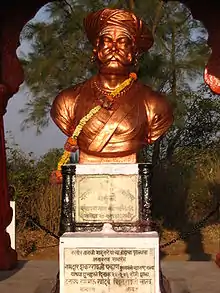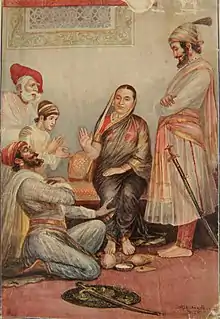Tanaji Malusare
Tanaji Malusare was a military assistant of Maratha ruler Shivaji. A local poet Tulsidas,[lower-alpha 1] wrote a powada describing Tanaji's heroics and sacrifice of life in the Battle of Sinhagad,[1] which has since made him a popular figure in Marathi folklore.[2][3][4][lower-alpha 2] He came from a Hindu Koli family.[6][7][8][9]
| Tanaji Malusare | |
|---|---|
 Memorial of Tanaji Malusare The Subedar at Sinhagad fort | |
| Military general (Subhedar) of the Maratha Empire | |
| Died | February 04, 1670 Sinhagad (Pune, Maharashtra, India) |
| Spouse | Savitri |
| Children | Rayaba |
| Father | Kaloji |
| Mother | Parvatibai |
| Religion | Hinduism |
In popular culture
- Hindutva Ideologue V.D. Savarkar had written a ballad on him, which was banned by the colonial British government.[10]
- Gad ala pan sinh gela, a Marathi novel by Hari Narayan Apte was written in 1903, based on his life.[11][12]
- Sinhagad, a 1933 Marathi film was produced by Baburao Painter, based on the 1903 novel.[13][14]
- Bollywood actor-producer Ajay Devgn has produced and headlined a film based on his life titled Tanhaji, which was released on 10 January 2020.[15]
- Bengali writer Saradindu Bandyopadhyay wrote the Sadashib series where the younger version of Tanaji was mentioned as a close associate of Shivaji.
- In 1971 Amar Chitra Katha released a comic book called Tanaji, written by Meena Talim and illustrated by Vasant B. Halbe.[16]
- In the 2018 Marathi-language epic Farzand, Tanaji Malusare is portrayed by Ganesh Yadav.
See also
Notes
- Not to be confused with Goswami Tulsidas
- The text has not been dated conclusively. It is popularly accepted to be written not long after the Battle; however, some scholars have claimed the text to have been written in the eighteenth century.[5]
References
- Sardesai, Sakharam Govind (1946). "New History of the Marathas (Vol I)". Internet Archive. Retrieved February 25, 2020.
- Kantak, M. R. (1978). "The Political Role of Different Hindu Castes and Communities in Maharashtra in the Foundation of Shivaji's Swarajya". Bulletin of the Deccan College Research Institute. 38 (1/4): 51. ISSN 0045-9801. JSTOR 42931051.
- K. Ayyappa Paniker, ed. (1997). Medieval Indian Literature: Surveys and selections, An Anthology, Volume One. p. 375. ISBN 9788126003655.
- Rao, Vasanta Dinanath (1939). "SIDE-LIGHT ON THE MARATHA LIFE FROM THE BARDIC (शाहिरी) LITERATURE OF THE 18th CENTURY". Proceedings of the Indian History Congress. 3: 1194–1212. ISSN 2249-1937. JSTOR 44252466.
- Raeside, Ian (July 1978). "A Note on the 'Twelve Mavals' of Poona District". Modern Asian Studies. 12 (3): 394. doi:10.1017/S0026749X00006211. ISSN 1469-8099.
- David Hardiman (2007). Histories for the Subordinated. Seagull Books. p. 103. ISBN 9781905422388.
When Shivaji began his revolt in the following decade, the Kolis were amongst the first to join him under the leadership of the Sirnayak Khemi and they played a leading role in helping Shivaji to consolidate his power. The Koli Tanaji Malusare...
- Hardiman, David (1996). Feeding the Baniya: Peasants and Usurers in Western India. Oxford University Press. p. 221. ISBN 978-0-19-563956-8.
- Roy, Shibani (1983). Koli culture: a profile of the culture of Talpad vistar. Cosmo. p. 25. OCLC 11970517.
- Chandra, Satish (2003). Essays on Medieval Indian History. Oxford University Press. ISBN 978-0-19-566336-5.
- Derek Jones, ed. (2001). Censorship: A World Encyclopedia. Routledge. ISBN 9781136798634.
- Sisir Kumar Das (1991). History of Indian Literature, Volume 1. Sahitya Akademi. p. 532. ISBN 9788172010065.
- Apte, Hari Narayan (1903). Gaḍa ālā, paṇa sīha gelā (in Marathi). Pune: Ramyakathā Prakāśana.
- Ashish Rajadhyaksha; Paul Willemen (2014). Encyclopedia of Indian Cinema. Taylor & Francis. p. 239. ISBN 978-1-135-94325-7. Retrieved 10 February 2015.
- Nowell-Smith, Geoffrey (1996). The Oxford History of World Cinema. Oxford University Press. pp. 403. ISBN 978-0-19-874242-5. Retrieved 2020-01-14.
- "Taanaji The Unsung Warrior movie on Movie Alles". Movie Alles. 2018-06-22. Archived from the original on 2018-09-05. Retrieved 2018-09-05.
- Talim, Meena; Halbe, Vasant B.; Pai, Anant (1973). Tanaji: The Maratha Lion. Amar Chitra Katha. ISBN 978-81-8482-159-8. Retrieved 15 August 2020.
| Wikimedia Commons has media related to Tanaji Malusare. |
This article is issued from Wikipedia. The text is licensed under Creative Commons - Attribution - Sharealike. Additional terms may apply for the media files.
